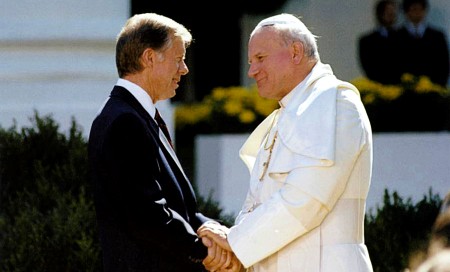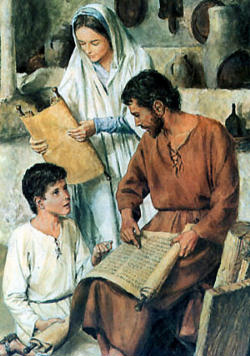Special: Ministerial Priesthood: A Definition from John Maria Vianney
FREE Catholic Classes
Eucharist makes the priest, who then shares himself for the life of his community in charity, holiness and forgiveness.
Highlights
Catholic Online (https://www.catholic.org)
8/4/2009 (1 decade ago)
Published in Asia Pacific
GORAKHPUR, India (Catholic Online) - Saint John Maria Vianney is in news in the Catholic Church the world over. It makes us wonder why this saint of the French revolution era, often so obscure to the outside world, is brought into the center stage, tand by none other than by Pope Benedict XVI? There is a telling contrast in this as one reflects over it.
It is that a great intellectual -our Pope- is reflecting and writing on the life and message of Vianney who is conventionally known for his lack of academic IQ and capacity in mastering the ecclesial sciences. The act of the Holy Spirit working through the Pope is the rediscovery of the reality of the rich presence of Jesus Christ in the person and ministry of Vianney, especially in his identity as the priest of Christ.
What does all this mean? To the Church of today and to the priests of today, the Pope is exhorting us to look at Vianney as a reference point for the ministerial priesthood. In Vianney the definition of the Ministerial priesthood is nothing but living and acting in persona Christi and sharing the Eucharistic Lord in charity, forgiveness and truth primarily in the community of faith and then to the world outside.
Ministerial priesthood has no raison d'ętre apart from the existential relationship of the priest with Christ who anoints him to be his face for his people. Vianney's life is a vibrant example of this relationship the beauty of which is that what some persons experience in the greatest mystical stage, he had it in the daily praxis of life. This made him to live not for him but for Christ and his people. His conviction there was that "a priest is not for himself."
From this relationship then comes the experience of Love. The eternal Love that God is, on the one hand, and on the other that eternal Love concretized in Christ for me and for the entire creation. Only in the love experience of the Triune God manifested in Christ and its appropriation in one's personal life that a priest will learn to transcend his weariness, weakness and self-seeking.
He transforms himself into a life sharer only in the concrete experience of the love of Christ. "The priesthood is the love of the heart of Christ," he experienced, lived and then preached. Prayer becomes the primary expression of that love in Vianney as Jesus himself gave us the example of prayer as 'being in union with His Father and to be led by the Spirit."
As a priest, it means also all the recognition that the Church as the first love of Christ. The community that obtains the dignity of being and becoming the Body of Christ on account of the plan of God and the redemptive sacrifice of Christ. This community's life and continuity depends on its union with Christ. Its nourishment is then Christ which is the Eucharist itself.
In this sense, Vianney built the Church of Christ in its local presence and reality with the Eucharist and other sacraments, especially the sacrament of reconciliation-popularly called the sacrament of confession- " I give sinners a small penance and the rest I do in their place", Vianney says.
The ministerial priesthood cannot be meaningfully exercised without appropriating the Eucharist into the centrality of the priest who is himself to become Eucharistically centred. Eucharist is an encounter with the living God who is present and who wants me to live in the present. As priests, Eucharist then defines our claim to being priests of Christ. It makes us believe in the transformative and saving love of Christ who becomes visible in the Church in the person of Priest in his enacting of the Sacrament of Eucharist. Eucharist makes the priest Christ's own.
Eucharist makes the priest, who then shares himself for the life of his community in charity, holiness and forgiveness. The community in turn grows into the Body of Christ nourished by the Eucharistic experience. In St. Vianney, we discover that Eucharist is thus not a mere ritual but the living encounter of the Lord with his people in the sacrificial love.
Two lessons that we, the post Vatican II generation, can draw from the life and message of Vianney: to say there is no ministerial priesthood without Christ and his Church and no priestly life without a life conjoined to Christ. Once there is this deep centrality of Christ in the life of the priest, everything then follows: truth, charity, forgiveness and holiness.
The result: together with the life of the priest the life of the Church is edified and modified. This is the reason the Holy Spirit has helped the intellectual Pope to teach us through the humble example of Vianney the greatest lesson in praxis: "He (Vianney) taught his parishioners primarily by the witness of his life."
The year of the priest, is defined now fundamentally in reference to the 150th dies natalis of John Maria Vianney. He who held the key to renovating and reinvigoring a Church and its priesthood which was affected by the consequences of French revolution, now once again offers the Church and her priests an opportunity to recover the essence of the ministerial priesthood.
-------
Fr. Santhosh Sebastian Cheruvally belongs to the diocese of Gorakhpur in India and holds a doctorate in Christology from the Pontifical Gregorian University, Rome.
---
'Help Give every Student and Teacher FREE resources for a world-class Moral Catholic Education'
Copyright 2021 - Distributed by Catholic Online
Join the Movement
When you sign up below, you don't just join an email list - you're joining an entire movement for Free world class Catholic education.

-

-
Mysteries of the Rosary
-
St. Faustina Kowalska
-
Litany of the Blessed Virgin Mary
-
Saint of the Day for Wednesday, Oct 4th, 2023
-
Popular Saints
-
St. Francis of Assisi
-
Bible
-
Female / Women Saints
-
7 Morning Prayers you need to get your day started with God
-
Litany of the Blessed Virgin Mary
Reflecting on the Legacy of Jimmy Carter
-

Feast of the Holy Family: Learning to Love, Pray and Live in the School of Nazareth
-

5 Biblical New Year's resolutions all Catholics should aspire to
-
Light a prayer candle for your New Year's resolution!
-
The Deacon Saint Stephen the Proto-Martyr is a Model for all Christians
Daily Catholic
 Daily Readings for Tuesday, December 31, 2024
Daily Readings for Tuesday, December 31, 2024 St. Sylvester: Saint of the Day for Tuesday, December 31, 2024
St. Sylvester: Saint of the Day for Tuesday, December 31, 2024 Prayer for a Blessing on the New Year: Prayer of the Day for Tuesday, December 31, 2024
Prayer for a Blessing on the New Year: Prayer of the Day for Tuesday, December 31, 2024- Daily Readings for Monday, December 30, 2024
- St. Anysia: Saint of the Day for Monday, December 30, 2024
- St. Theresa of the Child Jesus: Prayer of the Day for Monday, December 30, 2024
![]()
Copyright 2024 Catholic Online. All materials contained on this site, whether written, audible or visual are the exclusive property of Catholic Online and are protected under U.S. and International copyright laws, © Copyright 2024 Catholic Online. Any unauthorized use, without prior written consent of Catholic Online is strictly forbidden and prohibited.
Catholic Online is a Project of Your Catholic Voice Foundation, a Not-for-Profit Corporation. Your Catholic Voice Foundation has been granted a recognition of tax exemption under Section 501(c)(3) of the Internal Revenue Code. Federal Tax Identification Number: 81-0596847. Your gift is tax-deductible as allowed by law.







 Daily Readings for Tuesday, December 31, 2024
Daily Readings for Tuesday, December 31, 2024 St. Sylvester: Saint of the Day for Tuesday, December 31, 2024
St. Sylvester: Saint of the Day for Tuesday, December 31, 2024 Prayer for a Blessing on the New Year: Prayer of the Day for Tuesday, December 31, 2024
Prayer for a Blessing on the New Year: Prayer of the Day for Tuesday, December 31, 2024


